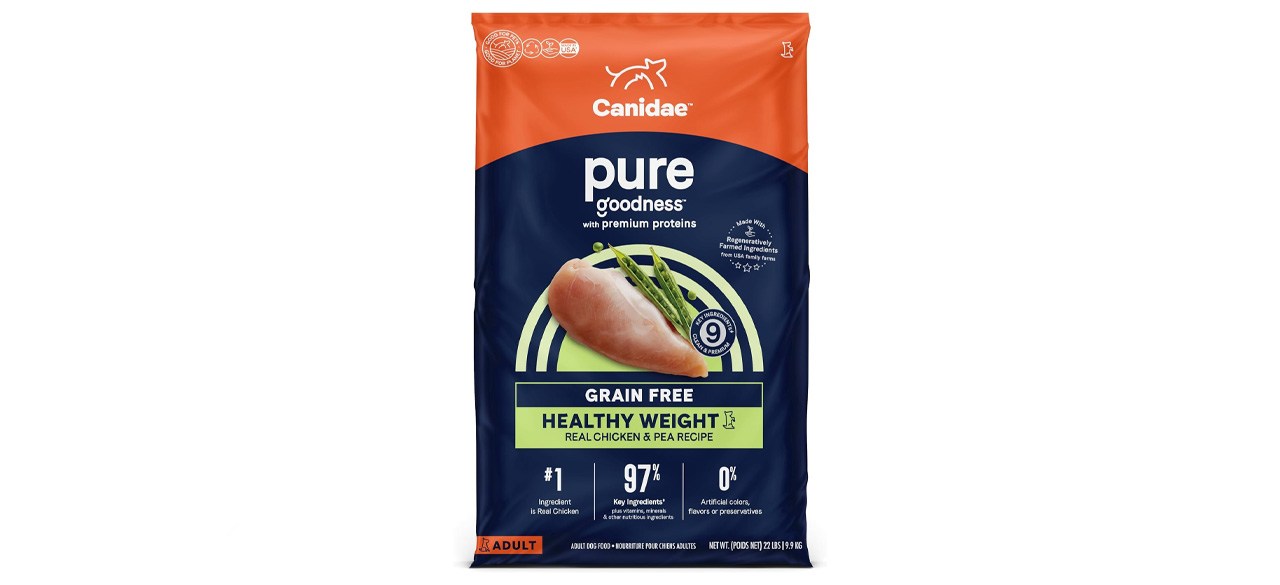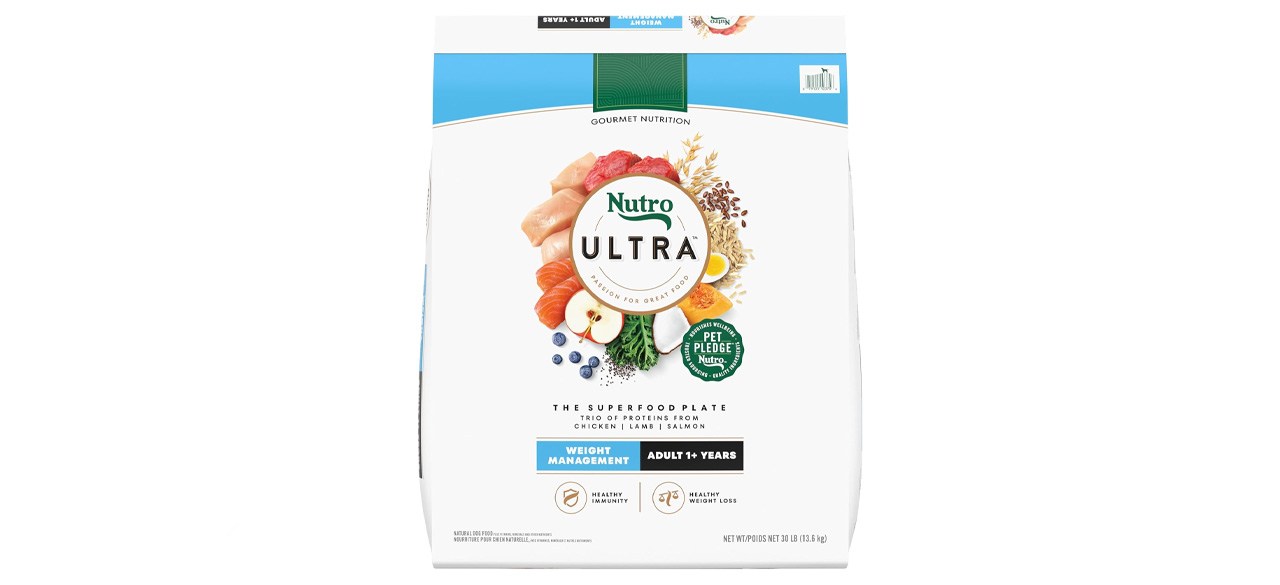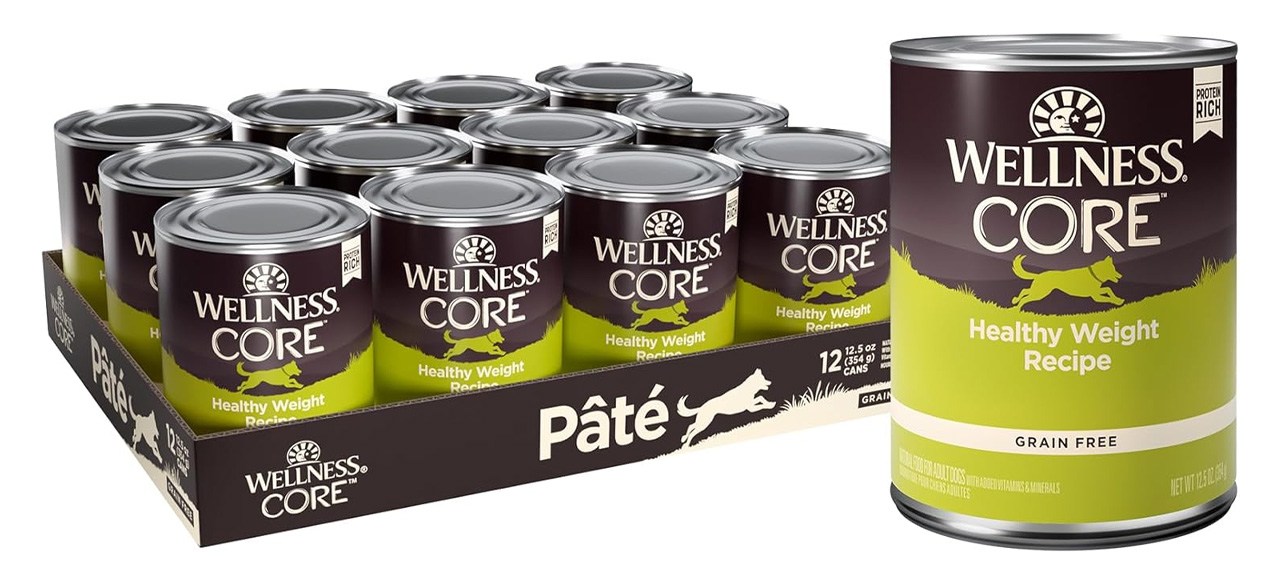Which dog foods are best for weight management?
If your dog has been looking a bit plump in the midsection lately, it may be time to consider switching them to dog food formulated for weight management. Just like in humans, too much weight leads to a host of health problems in your furry companion, including joint issues, heart disease, high blood pressure and immune system problems.
Dog foods made with high-quality ingredients, such Canidae Pure Healthy Weight Limited Ingredient, can help your pup shed weight naturally and increase their energy levels due to the higher nutritional content. This means they’ll be happier to go on long walks or have more or longer play sessions.
What to know before you buy dog food for weight management
What causes a dog to become overweight
As with humans, the most common reason a dog becomes overweight is a calorie surplus. They are simply eating more calories than their body uses regularly. If this is the reason, increasing activity levels and switching to a weight management food or simply feeding them less of their current food should eventually solve the problem. If you have already done this and aren’t seeing results, the causes could be genetic, in which case you should discuss this with your vet.
How to tell if your dog is at a healthy weight
Because a dog’s ideal weight varies by age, breed and build, a simple visual inspection from various angles is the best and easiest way to tell if your dog is overweight. You should be able to see a defined waist when looking from above and a tucked-in stomach when looking from the sides. The ribs may be slightly visible though they should not be sticking out prominently.
Ingredients to avoid in quality dog foods for weight management
Many dog foods use low-quality ingredients because they are inexpensive, help to satiate a dog, preserve the food for longer or make it more flavorful or visually appealing. However, they have poor or no nutritional value and should be avoided if possible. These include corn, corn syrup, artificial coloring or flavoring, BHT, BHA and meat byproducts.
Features to look for in a quality dog food for weight management
Protein source
The protein source is one of the essential ingredients to look at when choosing any dog food. It should be a high-quality whole protein and not any byproducts, which may be of inferior nutritional content or not processed and stored to the same standards as food for human consumption. The most common protein source in weight management formulas is chicken, but you can also find options made with fish, beef, duck and lamb. Foods with mixed proteins will offer a complete amino acid profile, though they may be unsuitable for dogs with food sensitivities.
Nutritional values
Just like human food, dog food packaging contains a nutritional analysis table that shows you the amount of protein, fat and fiber. It will also show you moisture content and values for other nutrients and vitamins, such as omega fatty acids, glucosamine, chondroitin, probiotics, zinc and calcium. If you are unsure what the proper values are for your dog’s breed, age and condition, your vet can provide some guidance.
Ingredient-restricted formulas
Some dogs have food allergies that restrict what kinds of foods they can safely eat. There are many restricted-ingredient options that cater to this need, the most common of which are grain-free formulas and those made without specific proteins.
How much you can expect to spend on dog food for weight management
Both wet and dry dog foods usually cost $1-$4.50 per pound for weight management.
Dog food for weight management FAQ
Why isn’t my dog losing weight after switching to a weight management food?
A. The main reason some dogs don’t lose weight after being switched to a weight management food is that many people ignore calorie content or portion size. Discuss with your vet how many calories your dog should be consuming a day to lose weight, and then make sure you aren’t giving them more than the requisite amount of food. Don’t forget to include any treats you give them when adding up their daily calorie intake.
Along with dog food for weight management, how else can I help my dog lose weight?
A. In addition to switching to healthier food, the best thing you can do to help your dog lose weight is to increase their activity levels. Depending on the age and mobility of your dog, this may be additional play sessions, talking them along when jogging or hiking or simply increasing the time and distance of their daily walks.
What is the best dog food for weight management to buy?
Top dog food for weight management
Canidae Pure Healthy Weight Limited Ingredient
What you need to know: This limited-ingredient dog food is an ideal choice for overweight dogs who also deal with food sensitivities.
What you’ll love: It’s made without corn, wheat or soy and instead contains healthy, recognizable ingredients like chicken, peas, alfalfa and chickpeas.
What you should consider: Some picky eaters may not take to it.
Top dog food for weight management for the money
What you need to know: Made with several protein sources and superfoods, this dog food has a complete amino acid profile and plenty of nutrients.
What you’ll love: It doesn’t contain any low-quality meat byproducts and all of the ingredients come from trusted farmers and suppliers.
What you should consider: Its high number of ingredients means it isn’t a good choice for dogs with food allergies.
Worth checking out
Wellness CORE Natural Wet Grain Free Canned Dog Food
What you need to know: This low-calorie canned dog food has a strong aroma that can entice the pickiest of eaters.
What you’ll love: Its high moisture content will leave most dogs feeling satiated, even though they have consumed fewer calories than they usually would with other foods. This makes it very effective for weight loss.
What you should consider: It’s expensive, and opening the cans can be a hassle.
Prices listed reflect time and date of publication and are subject to change.
Check out our Daily Deals for the best products at the best prices and sign up here to receive the BestReviews weekly newsletter full of shopping inspo and sales.
BestReviews spends thousands of hours researching, analyzing and testing products to recommend the best picks for most consumers. BestReviews and its newspaper partners may earn a commission if you purchase a product through one of our links.


